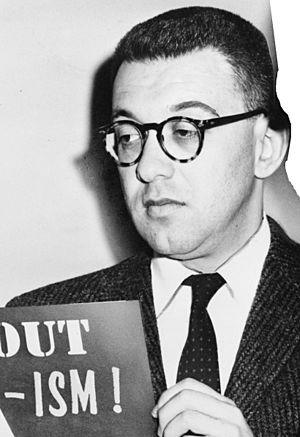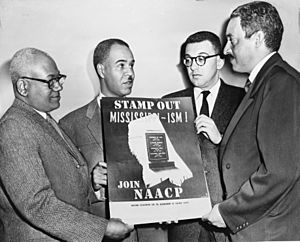Herbert Hill (labor director) facts for kids
Quick facts for kids
Herbert Hill
|
|
|---|---|

Hill in 1956
|
|
| Born | January 24, 1924 Brooklyn, New York, U.S.
|
| Died | August 15, 2004 (aged 80) Madison, Wisconsin, U.S.
|
| Nationality | American |
| Alma mater | New York University (B.A.) New School for Social Research |
| Occupation | NAACP labor director, writer |
| Spouse(s) |
Mary Lydon
(died 2001) |
Herbert Hill (born January 24, 1924 – died August 15, 2004) was an important American civil rights leader. For many years, he was the labor director for the National Association for the Advancement of Colored People (NAACP). This group works to ensure equal rights for all people.
Hill played a big part in the civil rights movement. He worked to make sure that labor unions treated African Americans fairly. He pushed unions to end segregation and include Black workers in jobs. He also wrote books and articles about these important issues. Later in his life, he became a professor at the University of Wisconsin–Madison.
Contents
Early Life and Education
Herbert Hill was born in Brooklyn, New York, on January 24, 1924. He grew up in a Jewish family and went to public schools.
He earned his college degree from New York University in 1945. After that, he studied at the New School for Social Research from 1946 to 1948. There, he learned from a famous thinker named Hannah Arendt.
Fighting for Equality
In 1951, Herbert Hill became the Labor Director for the NAACP. Even though he was white, he worked hard for racial equality. He stayed in this role until 1977.
Hill often spoke out against unfair practices in unions. For example, he criticized "nepotism," which is when relatives of union members are hired over others. He also pointed out problems in the film industry and how slowly the government was working on racial equality in jobs.
He criticized many large unions for not doing enough to support racial equality. These included the International Ladies Garment Workers Union, the United Auto Workers, and the United Steelworkers of America. He also disagreed with the AFL-CIO, a big union group, because they thought old rules about job experience should not be changed by new civil rights laws. Hill strongly supported affirmative action, which means taking steps to ensure equal opportunities for groups that have been discriminated against.

Hill also organized protests to bring attention to racial discrimination in construction jobs. Some unions were so upset by his actions that they threatened to stop giving money to the NAACP. However, the NAACP leaders, like Roy Wilkins, stood by Hill.
He wrote more than a hundred articles for different publications. He also worked as an advisor for the Equal Employment Opportunity Commission. This government agency works to prevent job discrimination. He also advised the United Nations on similar issues.
Campaign Against the ILGWU
One of Herbert Hill's most important efforts was against the International Ladies' Garment Workers' Union. This union was very powerful in New York City.
Even though the ILGWU had worked with the NAACP in some areas, by the early 1960s, there were almost no African American or Puerto Rican leaders in the union's New York City offices. Hill argued that the union was keeping Black and Puerto Rican workers in low-paying jobs.
Hill helped an African American worker named Ernest Holmes. Holmes was a cutter who was repeatedly stopped from joining the cutters' union. This meant he earned less money and didn't get important health benefits.
In 1962, a New York State group found that the union had broken anti-discrimination laws. The union tried to say this was not true. However, Adam Clayton Powell Jr., a powerful Congressman, held hearings about the union's practices. Hill testified at these hearings, speaking out against the union's leader.
Even though Hill was Jewish, some people accused the NAACP of being anti-Jewish for criticizing the union. Changes in the ILGWU happened slowly, especially after its main leader retired in 1966.
Allegations of FBI Informant Work
Some historical research suggests that Herbert Hill might have shared information with the FBI in the 1940s. This was about socialists he knew.
Documents from the FBI mention a person who was part of the Socialist Workers Party from 1943 to 1949. This person was also working for the NAACP as a labor official in 1962. Hill fit this description.
These FBI documents say that this person "cooperated" with agents and gave "information on individuals" from the Socialist Workers Party. Some historians believe these documents refer to Hill. Other important NAACP leaders, like Thurgood Marshall and Roy Wilkins, also cooperated with the FBI on certain matters.
However, not all historians agree on what these allegations mean or how important they are.
Death
Herbert Hill passed away on August 15, 2004, in Madison, Wisconsin. He had been ill for a long time. The University of Wisconsin–Madison, where he was a retired professor, announced his death. His wife, Mary Lydon, had passed away in 2001.
Works
- Anger and Beyond: The Negro Writer in the United States. Ed. Herbert Hill. New York: Harper & Row, 1966.
- The AFL-CIO and the black worker : Twenty five years after the merger. Alexandria, Virginia: National Association of Human Rights Workers, 1982.
- Black Labor and the American Legal System: Race, Work, and the Law. Madison: University of Wisconsin Press, 1985 ed.
- Race in America : The struggle for equality. Eds. Herbert Hill & James E. Jones Jr. Madison: University of Wisconsin Press, 1993.
 | James B. Knighten |
 | Azellia White |
 | Willa Brown |

